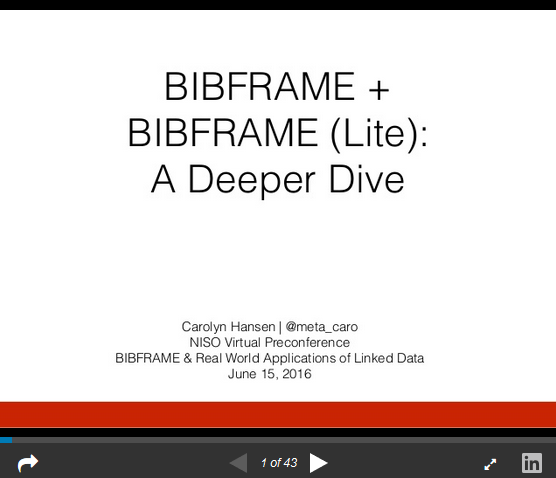by Sara Ring
Quick Summary
At the June 15 NISO virtual conference "BIBFRAME & Real World Applications of Linked Data" Tim Thompson from Princeton University Library discussed how they plan to represent handwritten annotations from Jacques Derrida's personal library using RDF vocabularies and ontologies.

At the June 15 NISO virtual conference "BIBFRAME & Real World Applications of Linked Data" I heard an interesting presentation from Tim Thompson, Metadata Librarian, Princeton University Library about their participation in the Linked Data for Production (LD4P) project. LD4P is an Andrew W. Mellon Foundation funded initiative aimed at taking technical services workflows from linked data theory to linked data practice. It's a collaboration between Stanford, Columbia, Cornell, Harvard, the Library of Congress, and Princeton. The goals of the LD4P project are to develop a new, distributed model for data exchange, and to extend core standards like BIBFRAME to cover specific domains. Visit the LD4P website to view all of the projects.
Princeton University Library's use case focuses on how to represent handwritten annotations using RDF vocabularies and ontologies. Princeton University holds French philosopher Jacques Derrida's personal library, which includes 19,000 published books. About 5,897 books/items were annotated by Derrida in some way, and about 6,770 books/items contain handwritten personal dedications to Derrida. Why did they choose this collection? Scholars are interested in having the ability to analyze and query the Derrida library. There is great interest in Derrida's social network and his connections with other writers and thinkers. If the library could devise a method for exposing the different types of relationships (who knew whom, who corresponded with whom), these kinds of inquiries would be possible for scholars.
To keep the scope of the project manageable, they chose to focus on encoding the personal dedications on items given to Derrida. They plan to collaborate with others on a BIBFRAME compatible extension ontology for the item level description of rare materials. Part of that will involve using the W3C's standards for encoding annotations. They want to entify more of their item level data, connecting dedications to authors to allow for querying the data in more interesting ways. For example, one could query on which items Derrida himself annotated, or which authors gave Derrida the most annotations. Or, query what were the most popular places of publication of the annotated materials. The overall project goals are to select 500 items with dedications, create metadata for each item using Linked Open Data standards and vocabularies, and convert the related bibliographic data to BIBFRAME.
The speaker reported out on a pre-project; they hand-coded 45 items in RDF using the W3C's Annotation Data Model as a framework, developed some exploratory queries, and met with faculty stakeholders to present their work so far and to discuss different use cases. If you're interested in the technical aspects of the project (e.g. sample RDF and SPARQL queries) view the presenter's slides here.
The W3C's Annotation Data Model was robust for the most part, but it did present some challenges. The W3C model is meant for use with web resources, not "real world objects" like they were dealing with in the case of Derrida's handwritten dedications. Under the W3C vocabulary, the creator of the annotation (oa:Annotation) cannot be distinguished from the creator of a physical transcribed annotation. Finally, one cannot differentiate between original, handwritten annotations and meta (cataloger-assigned) annotations.
Going forward, they plan to tackle the challenges mentioned above, digitize items (specifically covers, title pages, and dedication pages), and collaborate with other stakeholders (such as the Princeton Digital Humanities project). They are also working to create a BIBFRAME-compatible extension for rare materials and special collections.
If you're interested in learning more about real world applications of linked data, library staff in the Minitex region can view this and other NISO recordings via the Minitex MyLibrary portal. Login to your account and follow the “Archived Webinars from NISO, NASIG, ALA Editions” link. If you don’t have an account yet, visit the Minitex website, look for the “login” link in the upper right corner on the page, and follow the steps to set up an account.
Cover photo: Screen capture of opening slide from "Deframing Derrida: Encoding Annotations from Rare Books and Special Collections," a presentation by Tim A. Thompson, Princeton University Library

